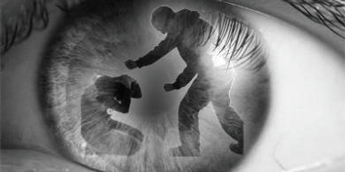Through the eyes of children
By Laila Muhammad | Last updated: Jul 18, 2014 - 11:41:06 AMWhat's your opinion on this article?
“The confusion of love with abuse is what allows abusers who kill their partners to make the absurd claim that they were driven by the depths of their loving feelings. The news media regrettably often accept the aggressors’ view of these acts, describing them as ‘crimes of passion.’ But what could more thoroughly prove that a man did not love his partner? If a mother were to kill one of her children, would we ever accept the claim that she did it because she was overwhelmed by how much she cared? Not for an instant. Nor should we. Genuine love means respecting the humanity of the other person, wanting what is best for him or her, and supporting the other person’s self-esteem and independence. This kind of love is incompatible with abuse and coercion.”

~Lundy Bancroft, Why Does He Do That?: Inside the Minds of Angry and Controlling Men

|
The poor where you keep going to the refrigerator knowing there’s nothing in it, and you know nothings coming.
We were the type of poor that borrowed bread, eggs, government-issued meat and powdered eggs from the entire neighborhood, and they gave us what they could spare, because let’s face it, they were poor as well. In a lot of impoverished communities, regardless of race or ethnicity, when there are no jobs, little to no opportunities, dilapidated homes, and drug infestation, the propensity for violence increases—and is at an all-time high.
We don’t have to quote statistics to understand this, a lot of us have lived this, and we continue to see the cycle every day. Just drive through any Martin Luther King Jr. Drive in America and you will understand.
My sister asked me if I remember walking to school with holes in our shoes, and I’m like, of course. I asked her if she remember eating Ramen noodles every night and drinking sugar water for dinner, and we both laughed. But then after we laughed we reflected on how bad we had it, how I as the oldest daughter had to “mother” myself and my two younger sisters because we had a mother addicted to drugs in the early 1980s when crack cocaine flooded many inner cities, especially in Chicago.
She recounted stories of my father physically abusing my mother because she stole all the appliances out of the house, the rent money and the Christmas presents. We couldn’t find her for 3 weeks. So there we were, sitting on the curb, saying goodbye to our friends, and watching the sheriffs set our furniture out. Some people might believe domestic violence is appropriate in situations like these. That my father was justified for blacking her eye, after all, she was a 20-something-year-old woman with a husband and five children who were left with nowhere to turn. But as a child watching this, you don’t get the full story. We aren’t weighing both sides, or even considering how her choices will impact our lives.
No we all bum rush our father, and try to pull him off her, and we resent him, and blame him for her leaving again and this time longer. There is no place for domestic violence in families. It only builds anger, and though the abuser may have seemingly justified reasons, one has to look past the immediate and see the long-term affects it has on children.
That is one of the earliest moments we could recall of domestic abuse in our family, and clearly not the last.
It got to a point where it became normal.
In talking with our other childhood friends growing up, it seemed to be the norm for their families as well. Little did my father (who is really a reformed and good man, has atoned with my mother, has a beautiful wife of 15 years and is a good grandfather) know that at that moment when he struck our mother, he planted a seed in the minds of all his children that domestic violence was acceptable. He unconsciously said to his sons, “It’s okay to beat a woman if they upset you, offend you, and steal from you.” He subliminally said to his daughters, “It’s okay for a man to beat you, cuss you out, degrade you in front of your children if you are in the wrong.” It set the stage for too many incidents to mention right now, but briefly each one of us as teenagers and some as adults have been hit by a man.
I recall at 16-years-old, I decided to be “grown” and move in with my 18-year-old boyfriend, who became abusive, threatened to kill me, and was a drug dealing and gun carrying thug. But that was the neighborhood I was raised in, it was the cool thing. And I was the good girl looking for a bad boy and so as I stared into the bathroom mirror after a fight contemplating murdering him, I saw the face of my mother staring back at me. I saw myself as a little girl with the same look on my face as she sat on the kitchen floor crying, feeling like she had no options so she couldn’t leave. So I packed my bags, left his place, begged my father to take me back in, and I never looked back, that was the first and last time I ever let a man hit me.
According to the National Coalition Against Domestic Violence, domestic violence is the willful intimidation, physical assault, battery, sexual assault, and/or other abusive behavior perpetrated by an intimate partner against another. The facts say:
One in every four women will experience domestic violence in her lifetime.
Eighty-five percent of domestic violence victims are women.
Witnessing violence between one’s parents or caretakers is the strongest risk factor for transmitting violent behavior from one generation to the next.
Boys who witness domestic violence are twice as likely to abuse their own partners and children when they become adults.
The Honorable Minister Louis Farrakhan did a lecture covered in the April 20, 1992 edition of this paper. He said, “There never was a time that so many of us have killed and abused one another as we are doing today. There never was a time when Black women were so abused and misused as they are today. There never was a time when Black children have been so abused and misused as we find them today. The violence and abuse in the home is so great that every teacher or leader of any consequence should begin to look at the destruction of the Black home, the Black family and the Black community and address these concerns with truth. I want to help you, sisters, to understand what you can do for this male who desperately wants to become a man and has all the potential to be great.”
May Allah bless you to seek help if you are in a violent relationship. May he strengthen our marriages and relationships and allow us to communicate effectively. And may we as women, be stronger, bolder and braver and understand that our life isn’t ours, but we owe it to our children to keep them whole and secure, and be good examples of positive Black relationships.
(Laila Muhammad is a Final Call production assistant, writer, and videographer based in Chicago. Follow her @liberatedvoices.blogspot.com, to purchase her paperback or eBook “Coffee makes you Black…so pour me some more,” go to http://www.lailamuhammad1.wordpress.com
INSIDE STORIES AND REVIEWS
-
-
About Harriett ... and the Negro Hollywood Road Show
By Rabiah Muhammad, Guest Columnist » Full Story -
Skepticism greets Jay-Z, NFL talk of inspiring change
By Bryan 18X Crawford and Richard B. Muhammad The Final Call Newspaper @TheFinalCall » Full Story -
The painful problem of Black girls and suicide
By Charlene Muhammad -National Correspondent- » Full Story -
Exploitation of Innocence - Report: Perceptions, policies hurting Black girls
By Charlene Muhammad -National Correspondent- » Full Story -
Big Ballin: Big ideas fuel a father’s Big Baller Brand and brash business sense
By Bryan Crawford -Contributing Writer- » Full Story






 Click Here Stay Connected!
Click Here Stay Connected!








